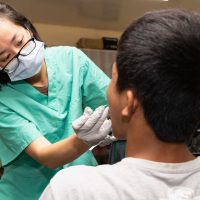Deadline: 22-Nov-24
The National Institutes of Health (NIH) invites Research Project Grant (R01) applications on the influence and intersection of sex and gender in health and disease, including: (1) research applications that examine sex and gender factors and their intersection in understanding health and disease; and (2) research that addresses one of the five objectives from Strategic Goal 1 of the 2019-2023 Trans-NIH Strategic Plan for Women’s Health Research “Advancing Science for the Health of Women.”
The awards under this FOA will be administered by NIH ICs using funds that have been made available through the Office of Research on Women’s Health (ORWH) and the scientific partnering Institutes and Centers across NIH.
Research Objectives and Scope
- To be responsive to this FOA, applications must address each of the following three variables, and their intersection, in the context of advancing a better understanding of health and disease and as relevant to the current research investigation:
- Sex-based variables: including but are not limited to anatomical and physiological traits that include external genitalia, secondary sex characteristics, gonads, chromosomes, and hormones, evaluation of sex as a biological variable; sex-based comparisons on conditions in females and males; or biomarkers.
- Gender-based variables: Including but not limited to social, environmental, cultural, and behavioral factors including gender identity, as an element of a person’s individual identity; or gender expression.
- One of the five objectives from Strategic Goal 1 of the 2019-2023 Trans-NIH Strategic Plan for Women’s Health Research.
- The strategic plan for Goal 1 has the following objectives:
- Discover basic biological differences between females and males. Studying female and male cells, organs, and biological systems is necessary to improve their understanding of the mechanisms by which sex influences health and disease.
- Investigate the influence of sex and gender on disease prevention, presentation, management, and outcomes. Sex and gender factors and their intersection influence the course of many diseases, including risk and protective factors, presentation, treatment, and recovery
- Identify the immediate, mid-, and long-term effects of exposures on health and disease outcomes. Various types of exposures affect disease risk across different timescales, ranging from an immediate outcome at the time of exposure to a delayed outcome that becomes evident at a later stage in life.
- Promote research that explores the influence of sex and gender on the connection between the mind and body, and its impact on health and disease.
- Expand research on female-specific conditions and diseases, including reproductive stages, and maternal and gynecologic health. Maternal health is critically important to the health of a woman during pregnancy and throughout her life-course, and for the health of her children. Because the maternal mortality rate in U.S. women is on the rise (GBD 2015 Maternal Mortality Collaborators, 2016), particularly in women of color, investigation of disparities in mortality and morbidity related to pregnancy is needed.
- In addition, applications submitted in response to this FOA are encouraged to consider:
- Health Disparities: Women are disproportionately affected by some conditions and diseases in terms of incidence, diagnosis, course, and response to treatment. Some populations of women may be at higher risk for adverse disease outcomes because of factors such as: biology, culture, education, sexual orientation, gender expression or identity, , access to care, and quality of care. .
- Life-course/Lifespan: The health of girls and women is affected by developmental, physiological, and psychological age. Women’s lives are marked by a continuum from intrauterine life to the elderly years: infancy, childhood and adolescence, menarche, reproductive life, the menopausal transition, postmenopausal years, the elderly, and the frail elderly. Each of these factors may influence health, disease, lifestyle, treatment choices, and response to therapy.
Research Scope
- This FOA supports basic, preclinical, translational, and clinical research investigations composed of teams who share expertise, knowledge, and skills in the following research formats:
- Interdisciplinary or transdisciplinary research that includes collaborations across a range of disciplines, including but not limited to, economics, medical anthropology, psychology, and demography to address research from a multi-disciplinary perspective that may address gaps in the fuller context of women’s lives and the underlying common root causes of poorer health outcomes.
- In addition to new, cross-cutting interdisciplinary research, studies that leverage existing funded cohorts and datasets for analyses of hypotheses related to sex and gender influences in health and disease are of high interest. Comparative analyses of existing samples/datasets/databases and/or data-mining and data curation to investigate the role of sex/gender are encouraged.
- This FOA is designed to stimulate research that incorporates and/or enhances understanding of the influence of sex and gender and their intersectionality in health outcomes.
Funding Information
- Application budgets may not exceed direct costs of $350,000 per year.
- Duration: The total project period for an application submitted in response to this FOA may not exceed 4 years.
Eligibility Criteria
- Higher Education Institutions
- Public/State Controlled Institutions of Higher Education
- Private Institutions of Higher Education
- The following types of Higher Education Institutions are always encouraged to apply for NIH support as Public or Private Institutions of Higher Education:
- Hispanic-serving Institutions
- Historically Black Colleges and Universities (HBCUs)
- Tribally Controlled Colleges and Universities (TCCUs)
- Alaska Native and Native Hawaiian Serving Institutions
- Asian American Native American Pacific Islander Serving Institutions (AANAPISIs)
- Nonprofits Other Than Institutions of Higher Education
- Nonprofits with 501(c)(3) IRS Status (Other than Institutions of Higher Education)
- Nonprofits without 501(c)(3) IRS Status (Other than Institutions of Higher Education)
- For-Profit Organizations
- Small Businesses
- For-Profit Organizations (Other than Small Businesses)
- Local Governments
- State Governments
- County Governments
- City or Township Governments
- Special District Governments
- Indian/Native American Tribal Governments (Federally Recognized)
- Indian/Native American Tribal Governments (Other than Federally Recognized)
- Federal Government
- Eligible Agencies of the Federal Government
- U.S. Territory or Possession
- Other
- Independent School Districts
- Public Housing Authorities/Indian Housing Authorities
- Native American Tribal Organizations (other than Federally recognized tribal governments)
- Faith-based or Community-based Organizations
- Regional Organizations
- Foreign Institutions
- Non-domestic (non-U.S.) Entities (Foreign Institutions) are not eligible to apply.
- Non-domestic (non-U.S.) components of U.S. Organizations are not eligible to apply.
- Foreign components, as defined in the NIH Grants Policy Statement, are allowed.
- Required Registrations
- Applicant Organizations
- Applicant organizations must complete and maintain the following registrations as described in the SF 424 (R&R) Application Guide to be eligible to apply for or receive an award. All registrations must be completed prior to the application being submitted. Registration can take 6 weeks or more, so applicants should begin the registration process as soon as possible. The NIH Policy on Late Submission of Grant Applications states that failure to complete registrations in advance of a due date is not a valid reason for a late submission.
- System for Award Management (SAM)– Applicants must complete and maintain an active registration, which requires renewal at least annually. The renewal process may require as much time as the initial registration. SAM registration includes the assignment of a Commercial and Government Entity (CAGE) Code for domestic organizations which have not already been assigned a CAGE Code.
- NATO Commercial and Government Entity (NCAGE) Code – Foreign organizations must obtain an NCAGE code (in lieu of a CAGE code) in order to register in SAM.
- Unique Entity Identifier (UEI)- A UEI is issued as part of the SAM.gov registration process. The same UEI must be used for all registrations, as well as on the grant application.
- eRA Commons – Once the unique organization identifier is established, organizations can register with eRA Commons in tandem with completing their full SAM and Grants.gov registrations; all registrations must be in place by time of submission. eRA Commons requires organizations to identify at least one Signing Official (SO) and at least one Program Director/Principal Investigator (PD/PI) account in order to submit an application.
- Applicant Organizations
- Program Directors/Principal Investigators (PD(s)/PI(s))
- All PD(s)/PI(s) must have an eRA Commons account. PD(s)/PI(s) should work with their organizational officials to either create a new account or to affiliate their existing account with the applicant organization in eRA Commons. If the PD/PI is also the organizational Signing Official, they must have two distinct eRA Commons accounts, one for each role. Obtaining an eRA Commons account can take up to 2 weeks.
- Eligible Individuals (Program Director/Principal Investigator)
- Any individual(s) with the skills, knowledge, and resources necessary to carry out the proposed research as the Program Director(s)/Principal Investigator(s) (PD(s)/PI(s)) is invited to work with his/her organization to develop an application for support. Individuals from diverse backgrounds, including underrepresented racial and ethnic groups, individuals with disabilities, and women are always encouraged to apply for NIH support. See, Reminder: Notice of NIH’s Encouragement of Applications Supporting Individuals from Underrepresented Ethnic and Racial Groups as well as Individuals with Disabilities, NOT-OD-22-019.
- For institutions/organizations proposing multiple PDs/PIs, visit the Multiple Program Director/Principal Investigator Policy and submission details in the Senior/Key Person Profile (Expanded) Component of the SF424 (R&R).
For more information, visit NIH.
For more information, visit https://www.grants.gov/web/grants/view-opportunity.html?oppId=344051








































